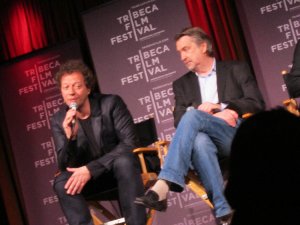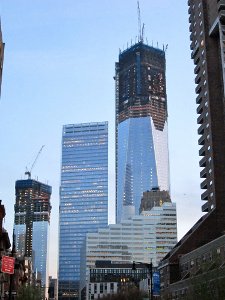
Robert De Niro opens the press conference
It seemed oddly fitting that the breakfast briefing for this year's Tribeca Film Festival should take place in a darkened room, hung with red velvet curtains... although it's unlikely the average cinema will be serving up Buck's Fizz and Bloody Mary's alongside the popcorn. Still, reasoning that I only arrived yesterday so my body clock thought it was 2.30pm not 9.30am, it seemed churlish to refuse.
Away from the pastries and cocktails, however, there was serious business afoot. Jane Rosenthal - after a very brief introduction from her festival co-founder Robert De Niro - began by noting how far the event has come to reach this, its 11th edition.
"As you know, we founded Tribeca as a response to 9/11 but now as we move into our second decade we're really excited about where we are today," she said. "The festival has been many things since it started and I know it's always a question everybody asks, 'What is Tribeca?'. It's been many things but it continues to evolve and continues to stay with our core principles - community, innovation, discovery and industry. We're proud of how far we've come and we're excited about where the next 10 years are going to bring us."
It has faced considerable criticism over the 'what is Tribeca?' question during the past decade but I've always thought it was quite admirable that the festival didn't aim to sit in the same niche year after year, even if that does mean - naming no names - that you sometimes have to take the rough with the smooth.

This year's festival - with 89 features and 60 shorts - selected from 6000 submissions - features everything from closing night blockbuster The Avengers through to criticially acclaimed world cinema, including Cannes Jury Prize winner Polisse and Berlinale Silver Bear winner War Witch (Rebelle) and the world premieres of a slew of independent films from across the globe. One thing that has certainly changed about Tribeca is its chief venues - now mostly concentrated in the Chelsea and Union Square areas of the city - but since it streamlined its offering a few years ago, the content has proved strong, especially in terms of world cinema.
There's a suspicion that this cosmopolitan feel is likely to be bolstered still further this year by the arrival of new artistic director Frédéric Boyer, who came to the festival from the Cannes Film Festival's Directors Fortnight. There, he had faced considerable resistance from the French press after he replaced outgoing (and much-loved by the critics) Olivier Pere as artistic director. After the French Society of Film Directors announced it would not be reappointing him to the post he told CineEuropa (read the full article here) that he hoped the guild would find "the solution for continuing to resist the diktats of a certain press which now only swears by its own, and to renew this contract of independence which makes it so unique and so precious in an increasingly formatted world".

Cannes' loss, would seem to be Tribeca's gain and at the launch this morning - which also featured input from Tribeca Enterprises creative director Geoffrey Gilmore, long-time director of programming Jenna Terranova and the festival's executive director Nancy Schafer - it became clear that "freedom" is something very important to Boyer, whose second year at Director's Fortnight placed a big emphasis on debut directors.
He said: "We want you, like us, to be moved and educated by film. I always want film to change, a little bit, my life. It's important, for me, that film can change a little bit, what I am."
Geoffrey Gilmore talked about his excitement about the "balance and diversity" in the festival. He added: "At the end of the day what we wanted to accomplish this year is programme quality. You don't programme with the idea that it has to be an attended or commercial work, you don't have to think about geography. We can talk about whatever aesthetic we want. So what makes a Tribeca film is that there are no limits. What Frédéric and I talked about was how much we feel liberated in terms of programming."
Somehow, ideas of liberation and freedom - also embodied by the new World Trade Center One/"Freedom Tower" taking shape against the Tribeca skyline - seem particularly fitting aspirations.





















